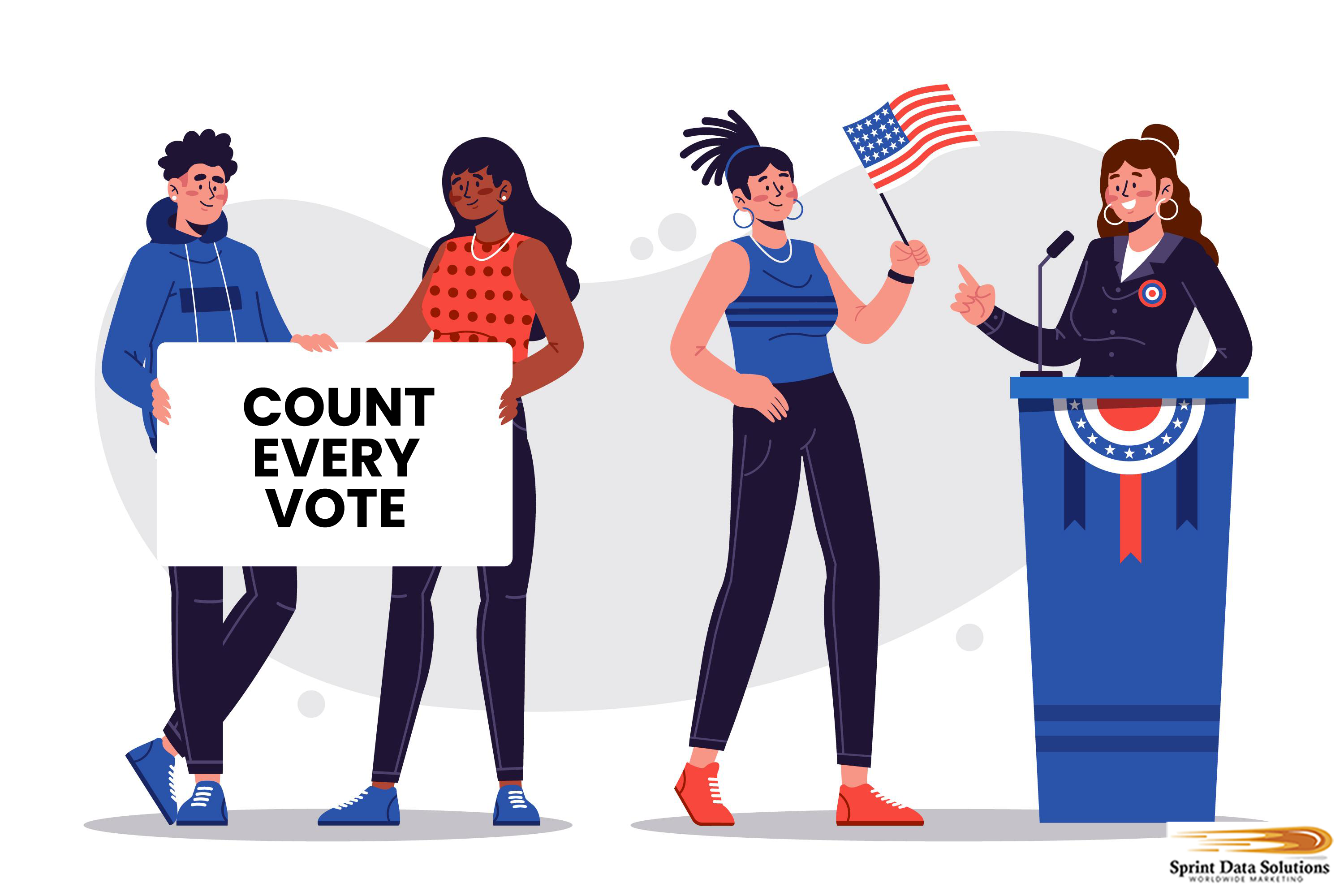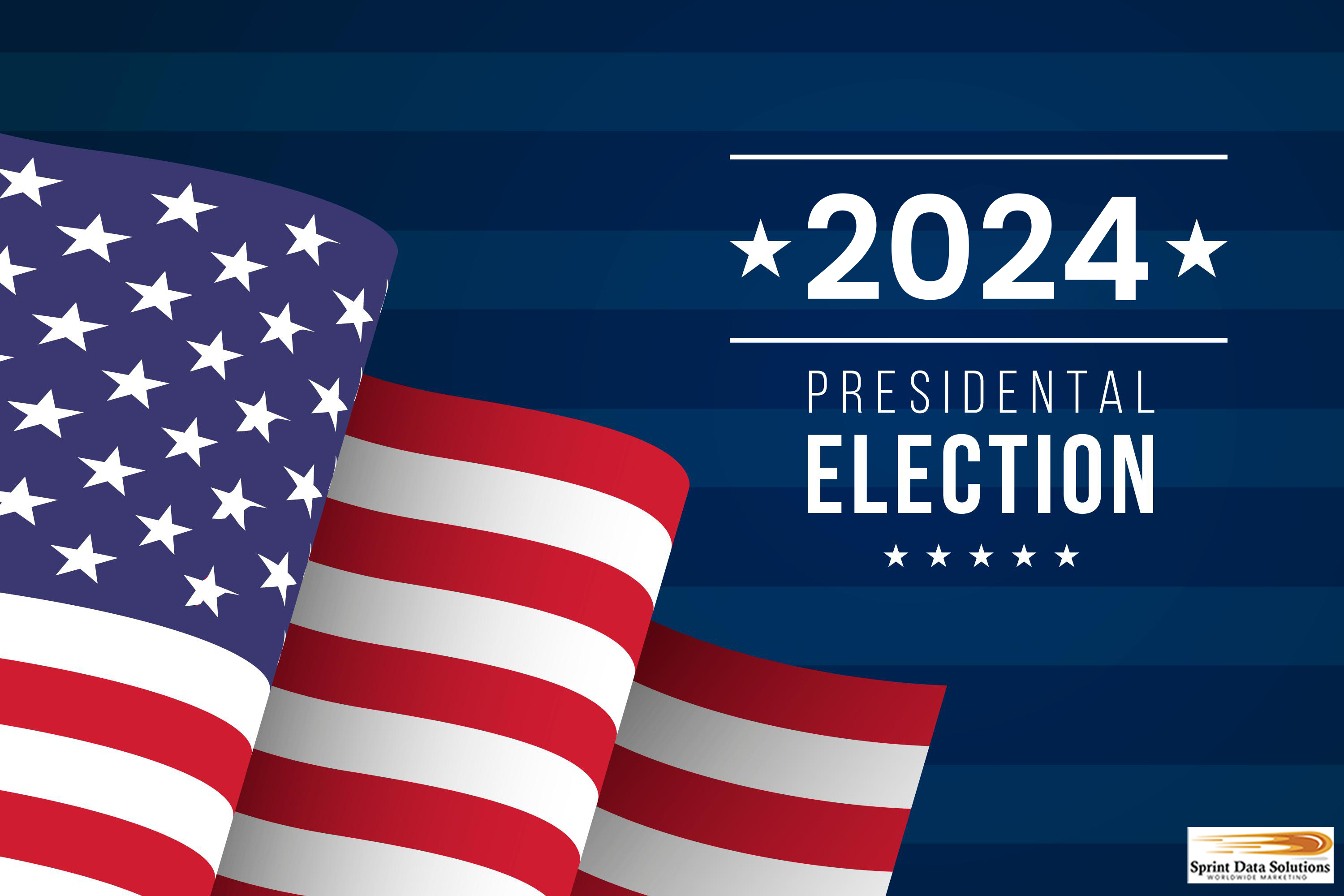Registered Voter Mailing List
The United States stands out as one of the few countries in the world where democracy has been an integral part of its governance since its founding. Unlike many nations, the U.S. system has always placed the power to choose leaders directly in the hands of its citizens. From local governments to the highest national offices, Americans have consistently been able to vote on who will represent their interests, ensuring that the process is grounded in public choice. This democratic model, established in the nation’s earliest days, empowers individuals to actively participate in shaping their government, making it an ongoing reflection of the people’s will.
Elections, as the cornerstone of this democracy, have evolved over time to become more inclusive and accessible. The election process encompasses a variety of activities, from grassroots campaigns designed to raise awareness and present candidates’ platforms, to public debates where prospective leaders make their case for why they should hold a particular office. In the past, voting required citizens to appear in person at designated polling places. However, as society has changed, so too has the voting process. One of the most significant modern developments has been the expansion of voting methods, including the ability to vote by mail. This shift ensures that even those who cannot physically be present at polling stations due to mobility challenges or conflicting work schedules can still exercise their right to vote. By allowing mail-in ballots, the U.S. has expanded access to democracy, accommodating individuals who might otherwise be disenfranchised. Whether citizens cast their vote in person or through the postal system, this flexibility ensures that the U.S. election process is more inclusive, fair, and accessible to all, regardless of personal circumstances.
The United States stands as one of the few nations where democracy has been the cornerstone of its governance since its founding, offering its citizens the unparalleled right to directly participate in the decision-making process. In the U.S., the people hold the power to choose who will represent their interests, whether at the local, county, state, or national levels. This practice of direct representation is embedded deeply within the nation’s fabric, ensuring that American citizens have a voice in selecting their leaders, from the leaders of their communities to the highest office in the land.
This democratic process culminates in the election, a pivotal event that requires extensive efforts from candidates to build awareness, foster support, and engage voters with compelling arguments about their qualifications and platforms. Throughout the campaign cycle, candidates actively reach out to the public, presenting their vision and convincing voters why they are the best choice for leadership. The election itself is the culmination of these efforts, and voting takes place on a designated day, where citizens head to polling stations to cast their votes. However, the U.S. has evolved significantly in its approach to voting, making the process more inclusive and accessible. In addition to in-person voting, voters now have the option to submit their ballots through the mail, ensuring that those who face physical or logistical barriers to attending a polling station can still participate fully in the democratic process. This expansion of voting options has significantly enhanced the accessibility of elections, offering a more equitable process for individuals with mobility challenges, those working irregular hours, or others who might otherwise be excluded from the voting process. These changes reflect a continuous effort to make democracy more inclusive, enabling greater participation and ensuring that every citizen’s voice is heard, regardless of their circumstances.
About Sprint Data Solutions Worldwide Marketing
Sprint Data Solutions Worldwide Marketing was founded by a disabled veteran with a clear vision of creating a 100% American-based business focused on fostering economic growth rather than continuing the legacy of military conflict. After years of dedicated service to the nation, the founder sought a new path—one that would help drive the growth of businesses crucial to the economy. The mission was clear: assist companies in expanding their customer base and increasing revenues, all while contributing to the country’s economic success. Las Vegas was chosen as the home base, where the company started as a small, local enterprise. Through years of delivering quality results, Sprint Data Solutions Worldwide Marketing gained a reputation for excellence and steadily grew, eventually employing a loyal team with over 50 years of combined experience in marketing and promotions.
Initially, the company’s focus was on direct mail marketing, a strategy that laid the groundwork for the expansive, data-driven services it offers today. This was before the rise of digital marketing, but direct mail still shared many common traits with today’s digital strategies, such as the emphasis on personalized outreach and targeted communications. Sprint Data Solutions built an impressive database by capturing critical contact information, including names, mailing addresses, and a wide range of demographic and psychographic data, enabling clients to execute highly targeted marketing campaigns. The success of this approach led to steady growth and a natural progression into the broader marketing landscape.
As the business flourished, the company’s reach expanded, starting with national coverage across the continental United States, including Alaska and Hawaii. With a growing demand for global marketing solutions, Sprint Data Solutions Worldwide Marketing further extended its services to include Canada and Mexico, solidifying its presence across North America. The next leap was into international markets, and the company now offers global services, including access to the European Union, with countries like France on the roster. Today, Sprint Data Solutions Worldwide Marketing continues to build on its founding principles, providing high-quality, targeted marketing solutions for businesses of all sizes, with an unwavering commitment to growth, precision, and client satisfaction.

Elections Are Different In The New Millennium
The democratic process and the ways in which voters are engaged have evolved significantly over the years, with the rise of the internet presenting new opportunities and challenges that are reshaping traditional campaigning strategies. While the core objectives of campaigning—convincing voters of a candidate’s fitness for office, showcasing their qualifications, and outlining their platform—have remained constant, the methods to achieve these goals have changed dramatically with technological advancements.
In the past, before mass communication, political campaigns were built around direct, face-to-face interactions, often consisting of visits to key locations where candidates delivered speeches and engaged with constituents. Print materials, such as posters, pamphlets, and leaflets, were essential tools for informing voters and building support. As radio emerged, it revolutionized campaigning by extending a candidate’s reach beyond physical boundaries, allowing their speeches and interviews to be broadcast to a far larger audience. This marked the beginning of a new era in political communication, where the power of voice became pivotal in influencing public opinion.
The advent of television took the transformation of political campaigning to new heights by adding a visual component to political messaging. Candidates could now communicate their message through televised speeches, interviews, and debates, which not only reached millions but also introduced the concept of televised political ads. These visual and auditory elements became critical for candidates in conveying their character, values, and platform to voters.
As we moved into the digital age, the internet has ushered in another profound shift in how campaigns are run. Online platforms, from social media to targeted digital ads, have opened up new channels for political outreach, providing candidates with more precise targeting capabilities. Social media has given candidates the ability to connect directly with voters, allowing them to shape narratives, rally supporters, and engage in real-time discussions, all while circumventing traditional media gatekeepers.
Today, political campaigns are a blend of traditional media, like TV and print, and modern digital strategies that make it possible to reach voters more efficiently and personally than ever before. The democratic process may still rely on the core values of persuasion and policy, but how campaigns are conducted, how voters are reached, and how candidates present themselves have evolved in remarkable ways. The use of big data, advanced analytics, and digital platforms continues to redefine how campaigns are run and promises to shape the future of democracy.
The rise of the Internet has fundamentally transformed the landscape of marketing, enhancing the precision and scope of targeted campaigns. With the ability to collect vast amounts of data from a variety of sources—including account sign-ups, memberships, and user behavior on websites—businesses can now develop highly detailed profiles of individuals, capturing not only basic demographic information but also their preferences, interests, and buying habits. This data is shared across platforms, providing organizations with deeper insights into consumer behavior, which can be leveraged for more effective and personalized marketing strategies. The Internet has also revolutionized content distribution by shifting from a model where consumers had to tune in to a specific time or channel to access content. Today, people can consume content on-demand, at their convenience, and from virtually anywhere, as long as they have access to an Internet-enabled device. This increased accessibility, coupled with real-time tracking and data analytics, allows businesses to engage their audiences more directly and efficiently than ever before, delivering tailored messages at the right time and place.
Who Benefits
Sprint Data Solutions Worldwide Marketing offers an expansive selection of contact lists that cover a wide range of categories, ensuring that we can meet the diverse needs of any business or organization. Whether you’re targeting consumers, businesses, or specialized groups, we provide accurate and up-to-date contact details to help you connect with your ideal audience. In addition, our services extend into the political sphere, where we offer not only individual contact information but also valuable data for political action efforts. This includes lists of potential voters, contributors, and supporters, allowing you to effectively reach and mobilize key groups for advocacy, campaigning, and political engagement. With our comprehensive and versatile database solutions, you can confidently tailor your outreach strategies and maximize your campaign’s effectiveness across various sectors. Some of the lists available include:
Registered Voter Mailing Lists
The foundation of American democracy is built on the active participation of its citizens, particularly those who have registered to vote. Voter registration processes vary by state, with some requiring individuals to register in advance of election day, while others allow same-day registration. Whether or not there is a compulsory requirement to affiliate with a specific political party—be it Republican, Democrat, or Independent—what remains crucial is the simple fact that these individuals have taken the initiative to officially engage in the democratic process. This act of registration signifies a commitment to civic responsibility and involvement, placing these individuals in a highly receptive position for political messaging. Their engagement with the electoral process indicates a heightened interest in political matters, making them valuable targets for targeted marketing campaigns aimed at influencing or informing voters. By recognizing this commitment to democracy, marketers can connect with an audience that is not only active but more likely to respond to calls to action related to political causes, campaigns, or initiatives.
State Voters Mailing Lists
While the presidency often takes center stage in national elections, it is the state-level elections that have a more direct and immediate impact on people’s daily lives. State elections encompass a wide range of positions, from governors to state senators and representatives, each playing a pivotal role in shaping local laws, education policies, taxation, healthcare, and more. These state officials are integral in determining the direction of critical public policies that influence the day-to-day experiences of residents. For candidates running for state office, reaching voters with targeted messaging is crucial to ensuring they understand the stakes involved. Educating voters on the implications of electing particular candidates at the state level can be a powerful tool for shaping voter turnout and campaign success. Effectively communicating how state decisions affect their lives enables campaigns to engage voters with relevance and urgency, increasing the likelihood of voter participation in these vital races.
National Voter Mailing Lists
In political marketing, it’s often essential to reach the broadest audience possible, which includes leveraging national voter mailing lists. This is particularly crucial for high-stakes elections like the Presidential race, where engaging voters from across the country is paramount to success. These lists help ensure that political campaigns can connect with millions of eligible voters, raising awareness, garnering support, and mobilizing voters to take action. Additionally, even for political activities with federal-level concerns, such as advocacy or policy campaigns, having access to a comprehensive, nationwide list allows for targeted outreach to key demographics, ensuring that the right message reaches the right audience at the right time. By utilizing our expertly curated national voter lists, campaigns can drive engagement, influence voter behavior, and ultimately achieve their political objectives with a greater impact.

Voter Precinct Mailing Lists
Voting precinct mailing lists are an essential tool for political campaigns and any action requiring precise targeting at the grassroots level. These lists provide invaluable insights into the demographics of a specific subdivision within an electoral district, allowing political organizations to identify and engage eligible voters directly. By having access to this highly specific data, campaigns can tailor their messaging and outreach efforts to the voters most likely to influence the outcome. Whether it’s for local, state, or federal elections, knowing the exact voters in a given precinct gives campaigns a strategic advantage, ensuring that political messaging reaches the right individuals at the right time. This granular level of targeting enhances voter engagement, optimizes campaign resources, and maximizes the impact of every communication. In addition to traditional election campaigns, precinct mailing lists are also invaluable for advocacy groups and political action committees looking to rally support for causes, initiatives, or legislative measures in particular regions.
Political Donor Mailing List
In addition to the vital role that citizens play in fulfilling their civic duty by voting, many individuals are driven to further contribute by financing political campaigns. Political campaigns often require substantial funding to reach voters, secure media presence, and mobilize efforts on the ground. Donations from individuals can be a pivotal factor in determining the success or failure of a campaign.
Donors come from all walks of life and represent a wide range of income levels. Even those with lower incomes may feel strongly enough about a cause or candidate to contribute a portion of their hard-earned money, believing in the greater impact their support can make. The middle class often gets involved by donating to candidates or causes that align with their political views, understanding that their contributions, while not always massive, can be impactful in grassroots efforts. On the other end of the spectrum, the affluent upper class tends to make larger contributions. For them, donations are often driven by the desire to influence policies that align with their values or business interests. For these high-net-worth individuals, contributions can be seen not only as a philanthropic gesture but also as an investment in the political outcomes that directly affect their financial and social interests.
In short, political donations come from a diverse group of Americans, with each donor contributing for different reasons—whether out of a sense of civic duty, personal conviction, or a desire for a more tangible return on their investment. No matter the motivation, these donations play an essential role in sustaining and advancing political causes and campaigns.
Conservative Political Donors
In the U.S., political donations are deeply influenced by party affiliation, with two major parties dominating the landscape: the Republican and Democratic parties. Conservative donors, who are generally aligned with the Republican party, tend to support causes that reflect their values and principles. Issues such as advocating for fewer restrictions on gun ownership, promoting Christian faith in public life, and supporting stronger immigration policies are commonly backed by conservative donors.
For political campaigns or organizations that focus on advancing conservative ideals, these donors can be an essential and reliable resource. During active political cycles, such as elections, the support of conservative donors becomes even more critical, providing the necessary financial backing to propel campaigns, initiatives, and advocacy efforts. Understanding the preferences and motivations of these donors allows political strategists to effectively tailor their messages and outreach strategies, ensuring that they resonate with the values of this influential demographic. By cultivating relationships with conservative donors, political organizations can secure vital funding and build a strong base of support for their causes.
Liberal Political Donors
Just as conservative political causes are often aligned with Republican ideals, liberal causes have found their voice within the Democratic Party, fueling a wide range of initiatives. Liberal movements remain as active and engaged as their conservative counterparts, with many individuals passionately supporting causes such as reproductive rights, LGBT+ protections, and improving the quality of education and social services. These causes have a long history of advocacy and activism in American politics.
In recent years, liberal causes have seen a significant increase in participation, especially as certain rights are perceived to be under threat. For instance, the Supreme Court’s decision to overturn Roe v. Wade has sparked renewed activism and led to a surge in donations for organizations advocating for reproductive rights. This heightened engagement has created a robust and energized donor base, eager to support causes that align with their values and ensure the protection and advancement of civil rights. Political groups that champion these issues have witnessed growing interest and an influx of financial backing, providing an opportunity for these movements to make a stronger impact on the national stage.
Independent Voter Mailing List
While a majority of American voters typically align themselves with one of the two main political parties, there is another group that takes a different approach. These independent voters often choose to support candidates based purely on policy positions rather than party affiliation. They prioritize issues that resonate with their personal values and concerns, making them a dynamic and influential demographic. Although independents may be excluded from nominating presidential candidates in certain states, they still play a crucial role in local elections, referendums, and donation efforts. Reaching out to these voters requires understanding their key issues and demonstrating how your stance aligns with their priorities. By appealing directly to their concerns, campaigns can build strong, lasting relationships with this influential group, ensuring that they feel heard and valued in the political conversation.
Undecided Voters Mailing List
One crucial, yet often overlooked, demographic in the voting process is the undecided voter. Despite their position of uncertainty, these voters can be the deciding factor in tight, highly contested elections where there is no clear majority. Undecided voters should never be underestimated; they are active participants in the electoral process, just waiting for the right information to make their decision. Winning over an undecided voter may require a more targeted and persuasive approach, with a clear presentation of the issues, candidates, and policies. However, as recent elections have demonstrated, even swaying a small portion of this group can dramatically impact the outcome. Engaging and addressing the concerns of undecided voters is essential, as their choices could very well determine the direction of an election, making them a highly valuable and influential demographic.
Political Activists Mailing Lists
Beyond fulfilling fundamental civic duties or contributing financially to political causes, political activism often requires a deeper commitment in the form of time, energy, and direct involvement. Political activists play a pivotal role in advancing causes they believe in, offering more than just monetary support. They are the driving force behind grassroots efforts, dedicating their time to activities such as canvassing, organizing events, managing administrative tasks, and supporting campaigns at all levels. In more impactful instances, activists may participate in public demonstrations, protests, and other forms of direct action, advocating for change and raising awareness for their cause. These individuals, motivated by genuine passion and commitment, are invaluable assets during election periods. Their unwavering dedication makes them essential in influencing public opinion, mobilizing voters, and ensuring the success of political movements. By dedicating both personal effort and resources, political activists can have a transformative impact on campaigns, contributing to the growth of social movements and the pursuit of meaningful political change.
Swing State Voters
At the federal level, one of the most influential and closely monitored demographics for determining the outcome of presidential elections is the group of “swing state voters.” Unlike states such as California, which reliably lean Democrat, or Texas, which consistently supports the Republican Party, swing states are unpredictable and can shift their allegiance from one election cycle to the next. These states play a pivotal role in determining the final results of a presidential race, as their outcomes are often uncertain and can tip the balance in favor of one candidate over another.
Given their crucial importance, swing states typically receive the lion’s share of attention during election cycles, with candidates focusing significant time and resources on courting voters in these areas. Because of this, having access to highly accurate and detailed databases of swing state voters is absolutely essential for political campaigns. Properly targeted outreach efforts, backed by comprehensive, up-to-date data, enable campaigns to focus their messaging where it matters most, driving voter engagement and ultimately influencing the outcome. Whether for political action committees, advocacy groups, or direct campaign efforts, targeting swing states with precision is key to navigating the complex landscape of federal elections and maximizing campaign impact.

A New Election Is Coming
While the next presidential election in the United States may not take place until November 2024, the strategic groundwork for a successful campaign starts long before that. Political organizations that understand the importance of early preparation know that the sooner they begin organizing, the better positioned they will be to effectively reach and engage voters when the time comes. Sprint Data Solutions Worldwide Marketing offers a powerful competitive advantage by providing multichannel voter contact solutions across every district in the country. Our detailed voter databases, which include up-to-date contact information and key demographic insights, ensure that political campaigns can reach the right individuals at the right time, through the most effective channels. By leveraging our resources early in the election cycle, campaigns can maximize their outreach, build strong relationships with potential voters, and develop impactful messaging strategies. With our expert data services, your campaign can act swiftly and decisively, enhancing your ability to connect with voters and drive results when it matters most.
Reach The Groups You Need
Sprint Data Solutions Worldwide Marketing offers an extensive collection of political and voter contact lists, providing not just basic contact details but also valuable demographic insights that can significantly impact campaign strategies. Our data is gathered from a wide range of trusted sources, including surveys, purchase behavior, and mailing list interactions, ensuring that every contact is thoroughly vetted for accuracy and relevance. This comprehensive data can be categorized and cross-referenced using advanced big data analytics, empowering political candidates and organizations to precisely target the right voters. By leveraging cutting-edge technology and detailed data compilation, we enable campaigns to access key demographics segmented by factors such as age, income, education level, voting history, geographic location, and even political affiliations. This targeted approach allows for highly personalized outreach, ensuring that candidates can connect with the most relevant voter groups, optimize their resources, and ultimately enhance their chances of success at the polls. With Sprint Data Solutions Worldwide Marketing, political campaigns can confidently engage with the right audiences and achieve their campaign objectives with precision and efficiency.
- Ethnicity
- Age
- Children’s Age
- Debt
- Homeowner
- Renter
- Marital Status
- Income
- Veteran Status
- Geography
- Mortgage Data
And more.
At Sprint Data Solutions Worldwide Marketing, we offer more than just physical mailing addresses for voters. Our comprehensive voter lists can be customized to include contact information across multiple channels, including email, text/SMS messaging, and telephone numbers, giving you enhanced access to voters, activists, and donors. Whether you’re running an election campaign, seeking volunteers, or targeting potential donors, our targeted voter mailing lists are meticulously crafted to reach the right demographics. By leveraging our robust and diverse database, you can significantly increase your outreach and engagement, ultimately raising the chances of achieving your campaign goals and securing an election victory. With our expert guidance and tailored solutions, you’ll have the tools necessary to connect with voters more effectively and efficiently, maximizing the impact of your campaign efforts.






